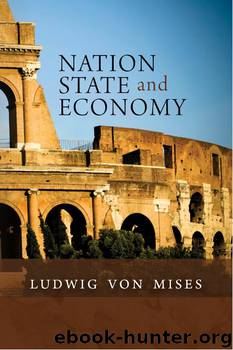Nation, State, And Economy by Ludwig von Mises

Author:Ludwig von Mises [Mises, Ludwig von]
Language: deu
Format: epub
Tags: Politics, LvMI, Austrian Economics
ISBN: 9780814796597
Google: EpyQAAAAIAAJ
Amazon: 0865976414
Barnesnoble: 0865976414
Goodreads: 4802290
Publisher: New York University Press
Published: 1983-03-15T00:00:00+00:00
Als Deutscher ward ich geboren,
Bin ich noch einer?
Nur was ich deutsch geschrieben,
Das nimmt mir keiner.
[As a German I was born,
Am I one still?
Only what I have written in German
No one takes away from me.]
But the German-Austrians had to come to terms with the fact that no Germany still existed, only a Great Prussia. From then on they no longer existed for the Germans in the Reich; they no longer bothered themselves about them, and every day the facts belied the pretty words spoken at gymnastic and shooting festivals. The Great Prussian policy prepared to travel those paths on which it finally wound up at the Marne. It no longer cared about the Germans in Austria. The treaties that bound the Austro-Hungarian Monarchy with the German Reich from 1879 on were concluded by the Great Prussian authoritarian government with the Emperor of Austria and the Magyar oligarchy in Hungary. Precisely they took away from the Germans in Austria the hope of being able to count on the help of the Germans in the Reich with regard to irredentist strivings.
The defeat that the Great German idea had suffered at Königgrätz was at first papered over by the fact that precisely because of the unfortunate outcome of the war the German liberal Party for a short time acquired a certain, if limited, influence on state affairs. For a dozen years it could furnish ministers to the government; during this time it repeatedly furnished ministers, even the Prime Minister, and pushed through many important reforms against the will of the Crown, the feudal nobility, and the Church. With extreme exaggeration, that has been called the rule of the Liberal Party in Austria. In truth, the Liberal Party never ruled in Austria; it could not rule. The majority of the people never followed its banners. How could non-Germans also have joined this German party? Among the Germans it always, even when it was flourishing, met strong opposition from the Alpine peasants blindly following the clergy. Its position in the House of Deputies rested not on having the majority of the people behind it but on the electoral system, which in a subtle manner favored the upper middle class and the intelligentsia but withheld the right to vote from the masses. Every extension of the right to vote, every change in the arrangement of electoral districts or of the manner of voting, had to be and was damaging to it. It was a democratic party, but it had to fear the consistent application of democratic principles. That was the inner contradiction from which it suffered and from which it was finally bound to be ruined; it resulted with compelling necessity from that proton pseudos [basic fallacy] of its program, which sought to reconcile Germanness with Austrianness.
The German Liberal Party could exert a certain influence on the government as long as this was allowed to it from above. The military and political defeats that the old Austrian princely state had repeatedly suffered compelled the Court to yield temporarily.
Download
This site does not store any files on its server. We only index and link to content provided by other sites. Please contact the content providers to delete copyright contents if any and email us, we'll remove relevant links or contents immediately.
The Secret History by Donna Tartt(16608)
The Social Justice Warrior Handbook by Lisa De Pasquale(11485)
Thirteen Reasons Why by Jay Asher(7782)
This Is How You Lose Her by Junot Diaz(5753)
Weapons of Math Destruction by Cathy O'Neil(5029)
Zero to One by Peter Thiel(4817)
The Myth of the Strong Leader by Archie Brown(4785)
Promise Me, Dad by Joe Biden(4440)
Stone's Rules by Roger Stone(4412)
Beartown by Fredrik Backman(4404)
How Democracies Die by Steven Levitsky & Daniel Ziblatt(4392)
The Fire Next Time by James Baldwin(4336)
100 Deadly Skills by Clint Emerson(4070)
A Higher Loyalty: Truth, Lies, and Leadership by James Comey(4024)
Rise and Kill First by Ronen Bergman(4008)
The David Icke Guide to the Global Conspiracy (and how to end it) by David Icke(3875)
The Farm by Tom Rob Smith(3869)
Secrecy World by Jake Bernstein(3773)
The Doomsday Machine by Daniel Ellsberg(3725)
